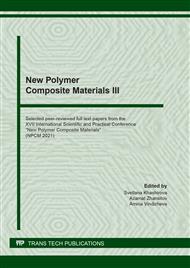p.405
p.413
p.420
p.426
p.434
p.440
p.451
p.456
p.463
Research on the Possibility of Recycling Medical Masks and their Use as Polymer Additives
Abstract:
This article studies the recycling of medical masks by the extrusion method. The main mechanical and physicochemical properties of recycled medical masks have been researched. It was revealed that the processed medical masks contain high physical and mechanical properties. The article shows the introduction of recycled masks leading to an increase in the manufacturability of the homo-and a block copolymer of polypropylene. In the case of a block copolymer, an increase in elastic-strength properties is observed. The introduction of recycled masks does not significantly affect the thermophysical properties of the homo-and a block copolymer of polypropylene.
Info:
Periodical:
Pages:
434-439
DOI:
Citation:
Online since:
September 2021
Authors:
Price:
Сopyright:
© 2021 Trans Tech Publications Ltd. All Rights Reserved
Share:
Citation:


